#Language death
Text
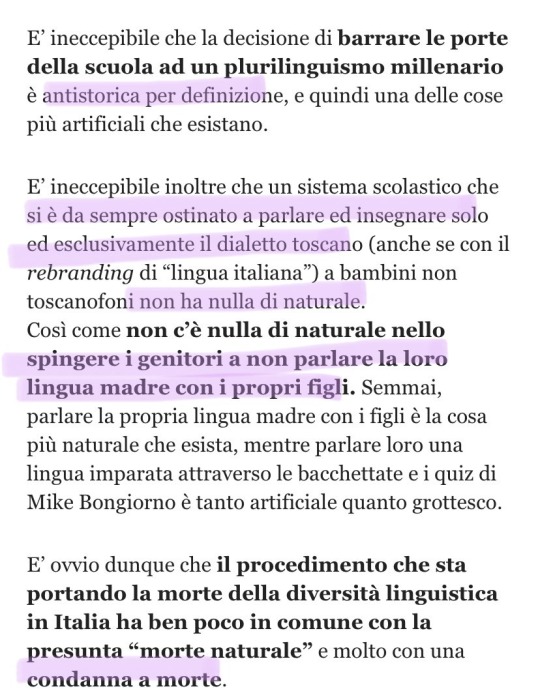
E’ ineccepibile che la decisione di barrare le porte della scuola ad un plurilinguismo millenario è antistorica per definizione, e quindi una delle cose più artificiali che esistano.
E’ ineccepibile inoltre che un sistema scolastico che si è da sempre ostinato a parlare ed insegnare solo ed esclusivamente il dialetto toscano (anche se con il rebranding di “lingua italiana”) a bambini non toscanofoni non ha nulla di naturale.
Così come non c’è nulla di naturale nello spingere i genitori a non parlare la loro lingua madre con i propri figli. Semmai, parlare la propria lingua madre con i figli è la cosa più naturale che esista, mentre parlare loro una lingua imparata attraverso le bacchettate e i quiz di Mike Bongiorno è tanto artificiale quanto grottesco.
E’ ovvio dunque che il procedimento che sta portando la morte della diversità linguistica in Italia ha ben poco in comune con la presunta “morte naturale” e molto con una condanna a morte.
A sobering article. It’s a good reminder that denial and promotion of linguicide is engineered by nation-states to enforce cultural and linguistic imperialism.
53 notes
·
View notes
Text
I get this bones-deep sadness when I think about endangered and dying languages. Whole cultures, ways of life, identities, vanishing because of oppression or poverty or violence or, perhaps worst of all, disinterest. The thought of finding that you can no longer speak in the language that your mother spoke to you in, that you grew up speaking, because your family and friends - your own children, even - can no longer understand it, makes me want to cry. One of the greatest tragedies of our time.
1 note
·
View note
Text
What is the primary sacred text of Judaism?
There are 24 books Judaism claims as its holy writings. They are the five books which tell of the origin of the Israelites and discuss the laws their God gave to them, the Torah (law); eight books written by or about the prophets of ancient Israel, the Neviʾim (prophets); and eleven books which contain wisdom and miscellaneous aspects of Israelite history, the Ketuvim (writings). Altogether, these books comprise the Tanakh.
The Christian Old Testament as used by Protestants has the exact same content as the Tanakh, but arranges the constituent books differently and usually splits the books of Samuel, Kings, Chronicles, and Ezra-Nehemiah into two each, and the book of the minor prophets into twelve. Jews are generally uncomfortable with this name, as it implies that the Tanakh is complete without the New Testament, along with different misconceptions on how Christians have translated and presented the Tanakh, discussed below. For the rest of this FAQ, this set of books will be referred to as the Tanakh except in its capacity of a constituent part of the Christian Bible.
Non-Protestant Christians include a number of books written during the Second Temple era or later in their Old Testament canons. These books are collectively known as the Apocrypha or Deutercanon, and are outside the scope of this FAQ.
What language(s) was the Tanakh written in?
Almost the entire Tanakh was written in Hebrew, while parts of the Daniel and Ezra(-Nehemiah), along with words and phrases from throughout the Tanakh, were written in Aramaic.
Was Biblical Hebrew written with vowels?
The Tanakh was originally written in a writing system called the Paleo-Hebrew alphabet, found in the Dead Sea Scrolls and other very early examples of Hebrew writing, and retained by the Samaritans. During the time of the Second Temple, the Jews gradually adopted a script derived from the Imperial Aramaic script, and modified it to become the square script, which is now the more familiar "Hebrew script." Both were ultimately derived from the Phoenician alphabet, and operate on similar principles, to the point where there is essentially a one-to-one correspondence. They are both technically defined as abjads rather than proper alphabets, the reason being that they lack letters whose primary use is to express vowel sounds.
Why wasn't Biblical Hebrew written using a system that clearly marked vowels?
Hebrew is a member of a larger family called the Semitic languages, most of which do not have (or did not use to have) many distinct vowels. Arabic only has three, and there is no strong evidence that Akkadian had more than four. Aramaic, Ge'ez and Amharic all have at least five, and there is evidence that Ugaritic did as well, but the additional vowels in these languages do not converge the way they would if they had been inherited from a common ancestor.
At the beginning of its written history, a predecessor of Hebrew, either Proto-Northwest Semitic or an immediate descendant, likely had three vowel qualities /a i u/. Its writing system, the Proto-Sinaitic alphabet, accordingly lacked vowel letters, as a given consonant sequence would have been substantially less ambiguous than in other languages with larger vowel inventories.
In the stages between PNWS and Hebrew, and in Hebrew itself, a number of different sound changes caused its vowel inventory to expand, ultimately adding two, possibly three, more vowel sounds /e o (ǝ)/. As Hebrew developed, so did the variant of the Proto-Sinaitic script used to write it, albeit more slowly, giving rise to both the Paleo-Hebrew alphabet and the square script. As the written forms of a language are more conservative than their spoken forms, and the changes which brought about these additional vowels were very gradual, there was no impetus for any group of scholars to sit down and propose the addition of vowel letters to be used in writing Hebrew before it went extinct around the beginning of the fourth century.
That being said, four letters, alpeh א, waw ו, he ה, and yodh י, used ordinarily to express consonants /ʔ w~v h j/, took on a secondary role of expressing vowels in variant spellings. The letters aleph and he were used for essentially any vowels, waw for rounded vowels, and yod for front vowels. In this capacity, such a letter is called an ʾem qriʾa or mater lectionis.
How do we determine the pronunciation of Biblical Hebrew if it is extinct and did not have proper vowel letters?
Hebraicists rely on a number of different methods for determining the pronunciation of Biblical Hebrew words. Even though Hebrew went extinct, it was retained liturgically in Judaism, leading to three different vocalizations, the Tiberian, Babylonian, and Palestinian. During the high middle ages, a group of Jewish scholars called the Masoretes developed systems of vowel markings called the niqqud to clarify these vocalizations in Hebrew writing. Only the Tiberian vocalization survived the middle ages or was extensively covered by niqqud, and it is referenced when determining the pronunciation of Biblical Hebrew.
The matries lectionis produced variant spellings of certain words, which also clarifies the pronunciation.
In ancient times, a Greek translation of the Tanakh was produced called the Septuagint (abbreviated LXX). Its origins are shrouded in fable, but it is generally agreed by historians of the Bible that in the mid-third century BC, about seventy rabbis gathered in Alexandria and translated at least the Torah into Hebrew, with the rest of the Old Testament completed by the first century. As Greek is written in a proper alphabet, the vowels used in proper nouns and loanwords give insight into how these words would have been pronounced in Hebrew.
Around the middle of the third century AD, a critical edition of the Tanakh called the Hexapla was produced. Consisting of six columns, it placed the Hebrew text alongside an attempt to write the Hebrew text with the Greek alphabet (in the second column, this text is called the Secunda), and four different Greek translations. Though it exists in fragmentary condition, the Secunda gives some insights into the pronunciation of Hebrew.
Syllable timing can be predicted based on Biblical poetry.
Finally, as it is part of a larger language family, Hebrew can be compared with other Semitic languages that have been spoken constantly since antiquity. Special emphasis is put on comparison to its closest living relatives, Aramaic and Arabic.
What is the Tetragrammaton?
It is a name for God used well over 6000 times in the Tanakh, spelled using four Hebrew letters, יהוה.
Have any of the above methods been useful in determining the pronunciation of the Tetragrammaton?
Judaism developed a taboo against pronouncing the Tetragrammaton during the Second Temple Period. For this reason, except for one possible exception (and even that is doubtful), no LXX manuscript presents a genuine effort to transliterate the Tetragrammaton; the only remaining fragments of the Secunda which include sections featuring the Tetragrammaton replace it with the Hebrew form amidst the Greek letters; and Tiberian vocalization lacks a pronunciation for it. In addition, all four of its letters can be matries lectionis, and it lacks known cognates in other Semitic languages.
Samaritanism developed the taboo later, and a group of Jewish mystics that survived a century or so after the destruction of the Second Temple never had it. In the fourth century, Theodoret, in his Quaestiones in Exodum, records a Samaritan pronunciation of /i.a.ve/, consistent with Clement of Alexandria recording a mystic pronunciation of /i.a.we/ in the fifth book of his Stromata. Since /v/ and /w/ were never distinguished readily in any form of Hebrew, this points to a pronunciation /jah.weh/, hence the spelling Yahweh.
The name "Jehovah" was an earlier rendering of the name, produced from a misconception among Christian Hebraists when encountering the Tetragrammaton in Masoretic texts. To prevent anyone from even accidentally saying the name aloud, a practice arose of saying it with the vowels in the word for "Lord," אדוני adonai. Christian Hebraicists did not realize this was a hybrid word and thought it was God's actual name, producing /ja.ho.vah/, eventually Jehovah.
Is Lashawan Qadash as promoted by various Black Hebrew Israelite groups remotely authentic to the actual pronunciation of ancient Hebrew?
As with almost all other particular teachings of the BHIs, the Lashawan Qadash lacks any kind of historical evidence and is easily disproven.
For example, under LQ, the name of God is not "Elohim," but rather "Alahayam." However, the first element is cognate with Arabic إله /ʔi.laːh/ and is an element of a mile-long list of different theophoric names from the Tanakh, such as Elijah, Daniel, etc, consistently spelled ηλ /eːl/ in the LXX. This points to a front vowel, both long before Hebrew became a distinct language, and towards its extinction. The second vowel is confirmed by the spelling variant which includes a waw, indicating a rounded vowel. However, the BHIs who employ LQ do not use a variant "Alahawayam." The word itself is the plural of the word "eloah" (please note that verbs always indicate grammatical number in Hebrew, and that the actions of the God of Israel are described using singular verbs in the Tanakh) which has always had a letter waw. The same plural ending shows a consistency with vowels in Aramaic plural endings. The pronunciation of the entire word is consistent with the form ελωειμ as found in the Secunda for Psalm 72:18. Black Hebrew Israelitism is usually conspiratorial, and BHIs will suggest the pronunciations of Hebrew proposed through accepted methods of historical methods are actually some kind of wicked plot perpetrated by the Jesuits, Masoretes, adherents of Babylonian mystery religion, or some combination thereof, usually in cahoots with each other. Whatever shadowy force(s) which acted to produce the pronunciation "Elohim" would have had to alter every last Hebrew scroll and carving which contains the singular "eloah," waw in tow, and every last Septuagint and New Testament manuscript containing a theophoric name containing "El" to include the letter ēta, including those manuscripts which laid in dark caves and buried in the desert for centuries; every remaining Secunda fragment to spell the name as ελωειμ; convinced millions of Arabic speakers, men, women, and children, rich and poor, to say "ilah" and write accordingly; and convinced millioned of Aramaic speakers, men, women, and children, rich and poor, to use front vowels when saying nouns in the plural, and write accordingly, centuries before anyone seriously proposed that Arabic, Aramaic, and Hebrew were related languages. This is all that would have had to have been done just to deceive the whole world of the pronunciation of just one word. There are far more words which also present a host of problems under LQ.
The existing evidence suggests that LQ originated in 20th-century Harlem, without any historical precedent whatsoever, and does not belong in any serious discussion of Biblical Hebrew.
Why is it said that Hebrew "went extinct" when it has been in constant use by the Jews until the present day?
The term "extinction" in linguistics is used of languages without living native speakers. When the last native speaker of a language dies, that language is then extinct. Sumerian is extinct. Ancient Egyptian is extinct. Gaulish is extinct. Wampanoag is extinct. Ubykh is extinct. No informed person disputes any of these languages are actually extinct. However, many Jews and philosemites take offense at the term "extinction" when used to describe the ultimate fate of Biblical Hebrew.
The fact of the matter is that Assyria dispersed most of the tribes of Israel, and Babylon captured what was left. We do not know what happened to the 10 lost tribes, but the members of Judah and Levi began to speak Aramaic. Even after Cyrus the Great allowed the Jews to resettle Judaea, most Jews continued to speak Aramaic and teach it to their children. Through the Second Temple Era, Hebrew went from threatened to endangered. It did not matter that Hebrew was used in the synagogues; whether a language is alive or dead is determined at the cradle rather than the altar.
Bar Kochba attempted to reinvigorate Hebrew during his revolt around AD 130. After this revolt was suppressed by the Romans, any hope of Hebrew continuing were essentially dashed. The Mishnah, thought to have been among the final documents written in Hebrew during the lifetime of any native speakers, was completed around the turn of the third century, and was in a form that showed obvious changes one would expect of a language approaching extinction. There is not a shred of evidence that there were any native speakers more than a century after the Mishnah.
Extinct languages find use liturgically in different religious traditions throughout the world. No Jewish person or philosemite would deny, given sufficient information, that Avestan is extinct, despite its continuing use in Zoroastrianism. Nor would they deny the same about Coptic, Latin, Ge'ez, or Sanskrit, nor would they deny that Sumerian was in use by various pagan groups as long as 2000 years after it went extinct. Yet, for these same people, it is "inaccurate" or even "bigoted" to suggest the same regarding Hebrew. The knowledge of Hebrew during late antiquity and the middle ages was restricted almost exclusively to rabbis and Jewish literati, exactly 100% of whom spoke some other language natively. Yes, Hebrew was revived during the modern period, but it took great effort in creating enough vocabulary to describe the modern world, and there are enough difference between modern and Biblical Hebrew to motivate Avraham Ahuvya to create a modern Hebrew translation (for lack of a better term) of the Tanakh.
Simply put, if these people want to discuss historical linguistics, they need to use terms which are found in historical linguistics, as they are defined by historical linguistics, terms which specialists in the field, Jew and gentile, accepted a long time ago. This includes the term “extinction.”
Why don't Christians use Hebrew source texts when translating the Tanakh?
They do, and have been doing so constantly since the Reformation.
The printed Hebrew edition of the Tanakh, by Daniel Bomberg, was arranged from several Masoretic manuscripts collected and collated by Jacob ben Hayyim. This was the primary base text of the Old Testament in all Protestant English translations of the Bible from at least the Geneva Bible (first published 1557) up until at least the Revised Version (published 1885), and seemingly the Darby Bible of 1890 and American Standard Version of 1901. Only Catholic Bibles used the Vulgate as a source, and an obscure translation of the LXX by Charles Thompson was printed in 1808; this translation made its source clear on the title page, not that almost anyone paid attention to it.
A scholar of the Tanakh named Rudolph Kittel collated an even greater set of Masoretic manuscripts, creating the Biblia Hebraica Kittel (BHK), first published 1906. Later, it was determined that a manuscript, which had been produced in Cairo, mysteriously ended in the possession of a Russian Jewish collector named Abraham Firkovich, was displayed in Odessa, and then later in St. Petersburg (later Leningrad) was in fact the oldest complete copy of the Tanakh in Hebrew. It is now known as the Westminster-Leningrad Codex, and was made the primary source of printings of the BHK from 1937 onward, and by extension the OT of the Revised Standard Version. It later became the primary basis of the Biblia Hebraica Stuttgartensia (BHS), first published 1968, and by extension the OT in the New American Standard Bible, New International Version, Good News Bible, New RSV, New KJV, Contemporary English Version, World English Bible, English Standard Version, and New Living Translation, just to name a few. Another printed edition of the Old Testament in Hebrew, the Biblia Hebraica Quinta, was completed last year, also derived from the WLC, and there is no reason to believe it will not serve as the basis of future translations.
The LXX, Targumim, Dead Sea Scrolls, and Samaritan Pentateuch are occasionally consulted, mostly to illuminate the meaning of obscure Hebrew words or phrases, or solve inconsistencies among Masoretic manuscripts. The translators invariably place conspicuous footnotes to indicate such. If you do not believe Jewish translators of the Tanakh do the same thing, you need to explain how “amber” appears three separate times in the book of Ezekiel (1:4, 1:27, and 8:2) in the JPS Tanakh, in exactly the same places as it appears in Christian translations, despite the mystery which would surround the meaning of the base word, חשמל apart from the LXX.
#Hebrew#Hebrew language#Hebraicist#Hebraicists#Hebrew studies#Tetragrammaton#Language death#Tanakh#Old Testament#Seputagint#LXX#Dead Sea Scrolls#DSS#Targum#Targumim#Masoretes#Masoretic#Textual criticism#History of the Bible
0 notes
Text

two sets of guardians, one trailblazers for the future, the other pallbearers for the past.
light -> life, hope, drive
dark -> death, futileness, stagnancy.
while one set innovated for the future the other was stuck figuring out just how to survive the end.
#homestuck#hom3stuck#theres also shape language ARRGH#jake english#grandpa harley#bro strider#dirk strider#dave strider#alpha dave#alpha rose#rose lalonde#borzoi talks#borzoi meta#homestuck meta#something something pallbearers something something i cant get over alpha session death theme#anyways#borzoi art
2K notes
·
View notes
Text





So yeah, I have some feelings about Ed's reaction to being tortured himself versus his reaction to Stede being tortured.
#our flag means death#ofmd#ofmd s2#our flag means death season 2#stede bonnet#the gentleman pirate#edward teach#ed teach#blackbeard#blackbonnet#gentlebeard#rhys darby#taika waititi#torture cw#ableist language cw
2K notes
·
View notes
Text
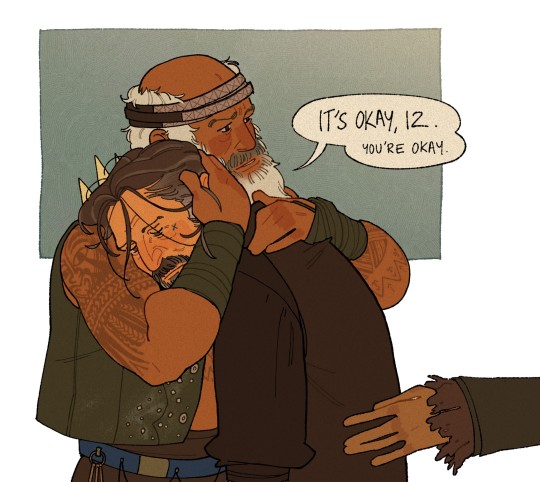
season two so far has really been feeding into my poly-crew delusions
izzy deserves love too, damnit
#anyway the crew's love language is physical touch#and izzy is a deranged touch-starved sad little man#soooo#1 + 1 = 2 as far as i can see#ofmd#izzy hands#ofmd fang#ofmd frenchie#our flag mean death#izzy hands fanart#ofmd fanart#dan's art
2K notes
·
View notes
Text
Dark!Naga!SatoSugu x reader x
Top of the Food Chain
I've always wanted to continue my naga!mha fic but considering i dont write for deku+co anymore, i decided to move my au a couple fandoms over:D 1.8k wc
Part two , Part three
(Warnings: animal deaths, blood, obsession, dark content, slight gun threat but not rlly, polyamory, gender ambigious!reader)
Despite being here for nearly a week, you still don't think Satoru understood how delicate you are.
He's overbearing, in that sense. Constantly poking and prodding and squeezing until your lungs give and you're forced to squeak. You can't blame him for not understanding. He's an animal, after all. Inhuman. Despite his skin and hair, the scales coating his tail give away just how different he is. He was probably born fighting, kicking, and screeching his way through the foliage, hunting, chewing, and biting.
He's not like you when all you knew when you were younger was coddling and softness. You can see it in his scars, and bruises, and marks.
Luckily, for you, Suguru had an inkling that you weren't made for sharp claws.
It's not a fight, you can tell when they're fighting, it's more like a warning? A minor disagreement. Suguru hisses at the other naga, scrunching up his face, showing his teeth. Satoru is quick to respond, but a little more playful. Fortunately for you, the black-haired male seems to win the argument. Satoru's coils loosen around you. Air stops fighting its way to get into your lungs.
You finally go lax in his hold. Satoru seems to enjoy that, dipping his head to bury his face into the base of his neck. The first few times he did that, you were afraid he was trying to bite off your jugular. Now, you think it's just another way he can soak up your body heat.
Maybe you've been here for longer than a week. At this point, you couldn't really tell. Hope that you'd be found was starting to slowly fizzle away. The explosion had been massive. The ship had sunk in a matter of minutes. With a disaster that huge, you doubt anyone would still be looking for survivors. Especially on an uncharted island, where myth had turned into reality.
Satoru had been the one you'd woken up to. Washed ashore, barely conscious. You were half-certain he was planning on eating you with the way he held your leg, watching your muscles bend and turn. In his defense, he must have thought you were dead. Your shrill scream quickly convinced him otherwise.
It was barely a fight. More or less, a pathetic kidnapping as he grabbed your body, slinging it over his shoulder. You've never remembered screaming and crying so loudly before, convinced you were about to be eaten. Suguru probably heard you before he saw you.
Satoru's mate was a little less impressed with you. Back then, they didn't bother learning your tongue, speaking in hisses and snarls, unaware of your misery. Suguru's frown was glued on his face, but the naga never let you run away, always keeping a hand or a tail on you at all times. It was a rough first day; you didn't know they weren't interested in eating you until they tried to feed you.
Things were much different back then Nowadays, they are a lot more considerate of yourself and your soft body. You think you've come to an understanding with these strange creatures.
Suguru was the nicest out of the two. In that, you mean the least rough. Compared to his counterpart, he's a bit smaller, but that's not saying there's any real difference. If it comes down to it, you are more than certain he'd be able to kill you off as quickly as his mate. You thought he hated you, at first. Now, you think he has a hard time showing blatant affection. His touches typically come in the dead of night, when you're barely conscious. A clawed finger gently raking over your soft skin. Large hands sculpting your face.
Satoru's eyes were the first thing you noticed about him. Glittering like blue sapphires. You had a feeling they weren't just for show. Time and time again he's proven that he can see better than Suguru could. He smiles a lot more, but you're starting to wonder if that expression translates across species. He can speak your tongue slightly better than Suguru could. It most likely has to do with his insistence on staying with you. The more time you spend with him, the more you have to say 'No' 'Don't touch there' 'Stop'.
In the rare times you manage to escape their hold, you like watching them interact with each other. They often sunbathe for hours, lazing around hot rocks to soak in the heat. They like touching each other. Sometimes it's aggressive, like when Satoru chomps on Suguru's neck and you're suddenly much more aware of how careful he is with you. Other times it's: soft, unintentional, meaningless. Languid cuddling when you are finally able to braid Suguru's hair.
At this point, you've surmised they won't eat you. At least, not for the moment. You don't exactly know what they think of you. Do they have the concept of pets in their worldview? Maybe that's the closest thing you can place yourself as, at least in their eyes. They must think you're helpless. To them, you have no claws, no fangs, no venom. They probably don't know you come from a species that's hunted others to extinction and currently burning down the planet. You must be the first time they've ever seen your kind, stripped away from your weapons, when you're the least dangerous.
"You should be more scared of me, you know," you once whispered to Suguru in the dead of night.
He was dozing off, blearily keeping his eyes open to stare at your moving lips. There was a grunt behind you, and Satoru tightened his arms across your waist. Greedy for affection, even in his sleep.
"Humans are terrifying," you said, reaching out to touch, "top of the food chain."
Suguru had smiled at that. You found yourself smiling back.
"You're lucky I didn't have a gun on me. You probably don't even know what that is." It's dark humor to press two fingers into his forehead. Your way of coping maybe.
Or perhaps your actions prove that humans will always desire to be violent, no matter how perilous their fight may be.
"Bang." He leans into your touch, unafraid. Oblivious to the threat that you are.
You're guessing Satoru only let you go because of the food Suguru brought.
You're able to feel the ground again as he glides over to Suguru having just come back from a successful hunt. The carcass of the largest deer you've ever seen is slung across his back. The smell of blood already makes you nauseous.
You think Suguru had been the most panicked when you refused to eat, clicking and cooing while he tried to force-feed you the bloody leg of a bear. Back then, your communication was even worse than it was now. You were smeared in crimson by the time he relented. Practically dripping in it.
Now, Suguru knows you have different tastes than them. You're not a big fan of raw. The fish and the handful of berries are more than enough to sate you as you gather the items he's given in your hands.
"Thank you," you say. You reach out, touching his face with warm fingers. He purrs into your touch. You smile. It's the least gratitude you can give him. After all, he's not asking for much. If they hadn't found you, you would have been dead long ago, or at least, significantly less weaker. It's the least you can do.
For a moment, you delude yourself into thinking they were your pets. It'd certainly be easy too. They have little to no regard for personal boundaries, much like dogs. They're more animalistic than they are human.
It's funny to think of these monsters as lovable pets.
"Thank you," Suguru repeats. You giggle. It's not like they actually understand you. It's simple mimicry. Like talking to a parrot.
"Thank you!" Satoru chirps, never one to be left out. He pushes his mate out of the way, eager for your pets as well. Suguru hisses, but doesn't argue. You've learned they like to be scratched right there on the bottoms of their chins.
Suguru's less obvious, but Satoru has no desire to pretend. He melts into you, practically slumping his weight into your weak hold. It's a little adorable actually. You give a little laugh. He seems even more pleased at that.
They're fun to be around, but this can't last. You belong with other humans, far far away from this island. So far, you hadn't seen any boats in the horizon, but you hope one would come by soon. A plane would be even better. Close enough to give you hope. Maybe if you built a big enough fire, it'd reach someone eye.
Hopefully, in just a few weeks, these creatures will be a very cherished memory.
You frown when Satoru reaches over to grasp at your food, the meat specifically. You glare, moving away from his hold. He titters in clear disappointment. You hate seeing him sad but you already have so few food sources. It's best to conserve whatever you get.
"No," you pointedly tell him, "It's mine. Mine."
His frown deepens, and he opens his jaws to let his fangs pop out.
"Mine," you repeat.
He leans back, huffing. You laugh because you know his expression is more out of frustration than any actual anger. Again, animals. You pet his head in apology, before turning away. You'd have to start a tiny fire to start cooking. Raw fish is edible, but it's hardly desirable.
A hand grabs yours, clawed, the grip is tight around your frail skin. When you look back, Satoru is staring at you. Eyes wide. Eager.
"Mine," he says, but it's more like he's testing the word. Tasting it on his lips.
You scoff, unamused. "That's my arm. Not yours."
Satoru smiles. Sharp teeth. You suddenly remember he's a carnivore.
He's slow when he draws you in, practically dragging you into his arms. You're used to his spontaneous hugs, tight and suffocating. You can't fight him off, so you typically wait until Suguru has enough of his behavior and drags him off you.
"Mine," Satoru repeats. Alarm bells ring in your head but it's easy to brush them off. It's mimicry. They can't understand. It's like talking to a parrot.
You feel the weight of the other naga at your back. His arms wrap around your waist, pushing you against Satoru's chest. You stiffen when Suguru's fangs lightly graze up your neck. Never quite punctures, but is terrifyingly close.
"Mine," Suguru says into your skin.
You laugh again, but it comes out less hesitant. More airy. Amid their hold, a sudden thought comes to you.
If you weren't at the top of the food chain anymore, then who was?
#yandere#dark content#yandere jjk#non con touching#yandere gojo satoru#yandere geto suguru#dark gojo satoru#dark geto suguru#naga au#naga gojo satoru#naga geto suguru#animal death#language barriers#polygamous relationship#Top of the Food Chain#yandere satosugu#dark satosugu#naga satosugu
1K notes
·
View notes
Text
my last reblog about ASL made me wonder about Palestinian Sign Language. I don't have much time to delve into it right now, but I did find a lengthy 2020 journal article about PSL, written by Mahmoud A. M. Abdel-Fattaha and Khalil M. I. Alawnah for the International Journal of Innovation, Creativity, and Change. here is a direct link to read it.
#bearer of the curse#it's fairly formal and more about how the language works than the culture surrounding it but I think that's just as valuable as#notes on culture -- it's important to understand the depth of it and how it fits into liguistic space since#language itself is culture#just saying that since people might expect it to be one thing when its another. free palestine & death to israel
871 notes
·
View notes
Photo

so something i just noticed today, looking back :
you know lots of animated characters, they can get very animated with their hand gestures, in puss in boots the last wish, it’s no exception, we saw various character doing it
except somehow, this guy
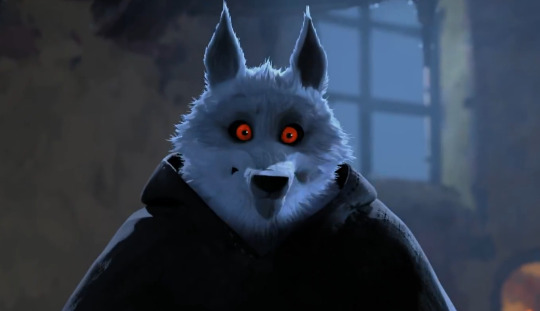
like he got lots of long dialogue shots but very rarely i saw his face and his free, empty hand doing whatever on the same frame?
also some examples below under readmore so it’ll be a long post
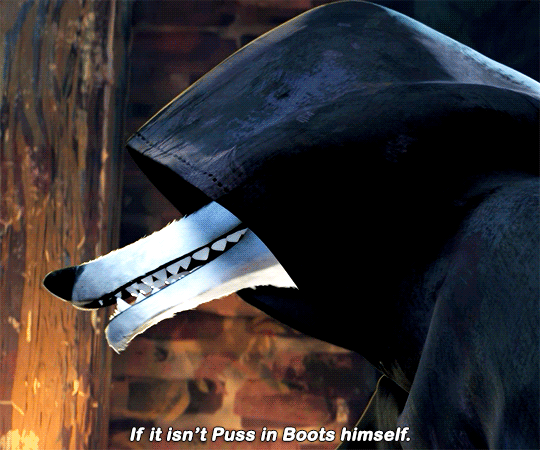

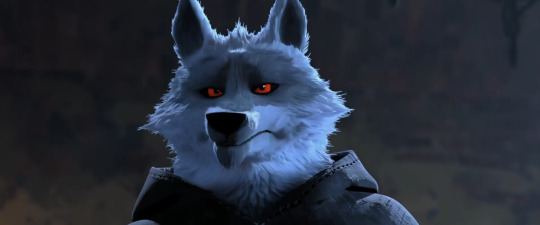
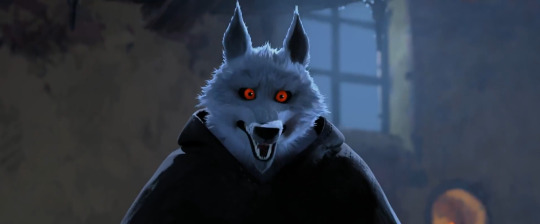

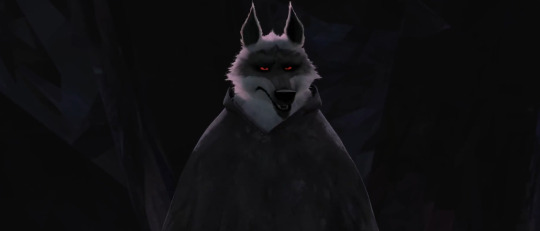

meanwhile with other characters, it's business as usual








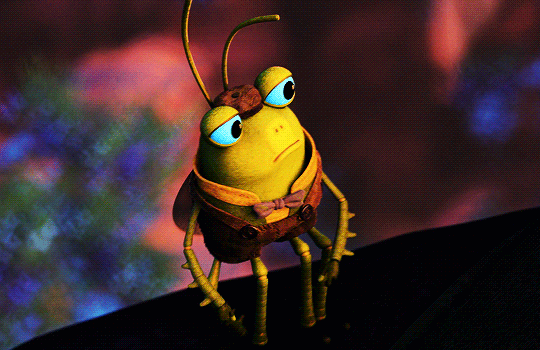
but i also noticed that his hands seems to do more movement/gesturings when he's holding an object, like the mug/coins/mainly his weapons

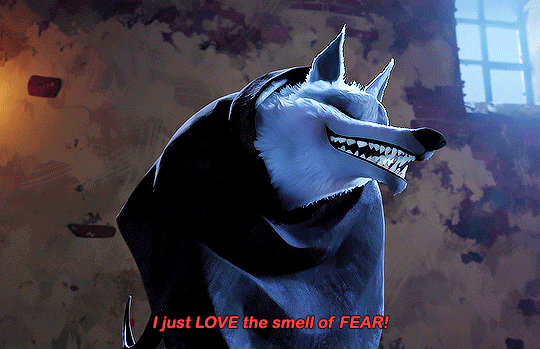
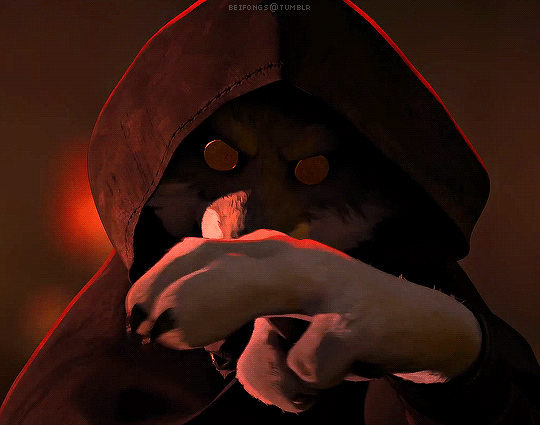


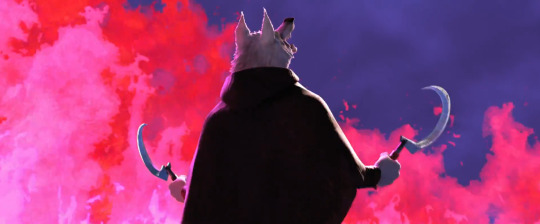
yeah so interesting detail that separate him from others there but i'm still not sure if this is more just for personality trait (as in the lack of hand gesturing isnt bad because in this case it's supposed to be something in character with him) or if there's deeper meaning
i'm started to think about this because when i was drawing him sometimes i was thinking what pose i should give him when he's talking and i was like....huh have he ever done this kind of pose? not even normal people pose you see often other people/characters do? especially the ones you saw during conversations?
and turns out, he never did.
so yeah, that was a "huh" moment right there
#puss in boots 2#puss in boots the last wish#puss in boots death#puss in boots wolf#kitty softpaws#perrito#jack horner#goldilocks puss in boots#goldilocks and the three bears#tldr death's whole body language gets more expressive the moment the sickles are out#but at the same time he makes doing normal people pose looks weird
6K notes
·
View notes
Text
Magicians way [part 1]
.・゜-: ✧ :-
It's not often that he finds himself in such position, but it does happen.
John Constantine never would have thought he'd scratch the "tied up by a cult to be used as sacrifice to summon a powerful ghost" spot on his bingo card.
He doesn't even feel threatened by the cult, hell, all he will receive from this day is pure embarrassment if the summoning circle is really the one he thinks it is.
Great, it's glowing.
Little bastard knows and is on his way here.
Shit.
"Oh all mighty King of Ghosts! We summon thee! Appear!"
If he has to listen to that badly scripted American movie summoning ritual one more word, he's gonna do some serious damage.
The circle lights up in sickly green, the ectoplasm flooding the insides of the portal as it opens.
And there he stands, the boyprince of the Infinity Realms.
"Hey, dad!" The being greets, swinging a swift fist against one of the cultist.
The rest are frozen and now that they're alone John sees the shit eating grin on the gremlins face.
"Danny." He greets back, watching as his kid swipes some invisible dust from his hat and putting it on back.
"Man, this is so embarrassing for you. Let me just—"
To make matters worse, Danny pulls out his bloody smartphone and takes a picture of him tied up.
"I'm sending this to mom." He's fiddling with the rope, smug smirk on him that John would love to flip off if his hands weren't bound.
"Useless..."
Ah, here comes the blackmail. A kids after his own heart.
The little shit.
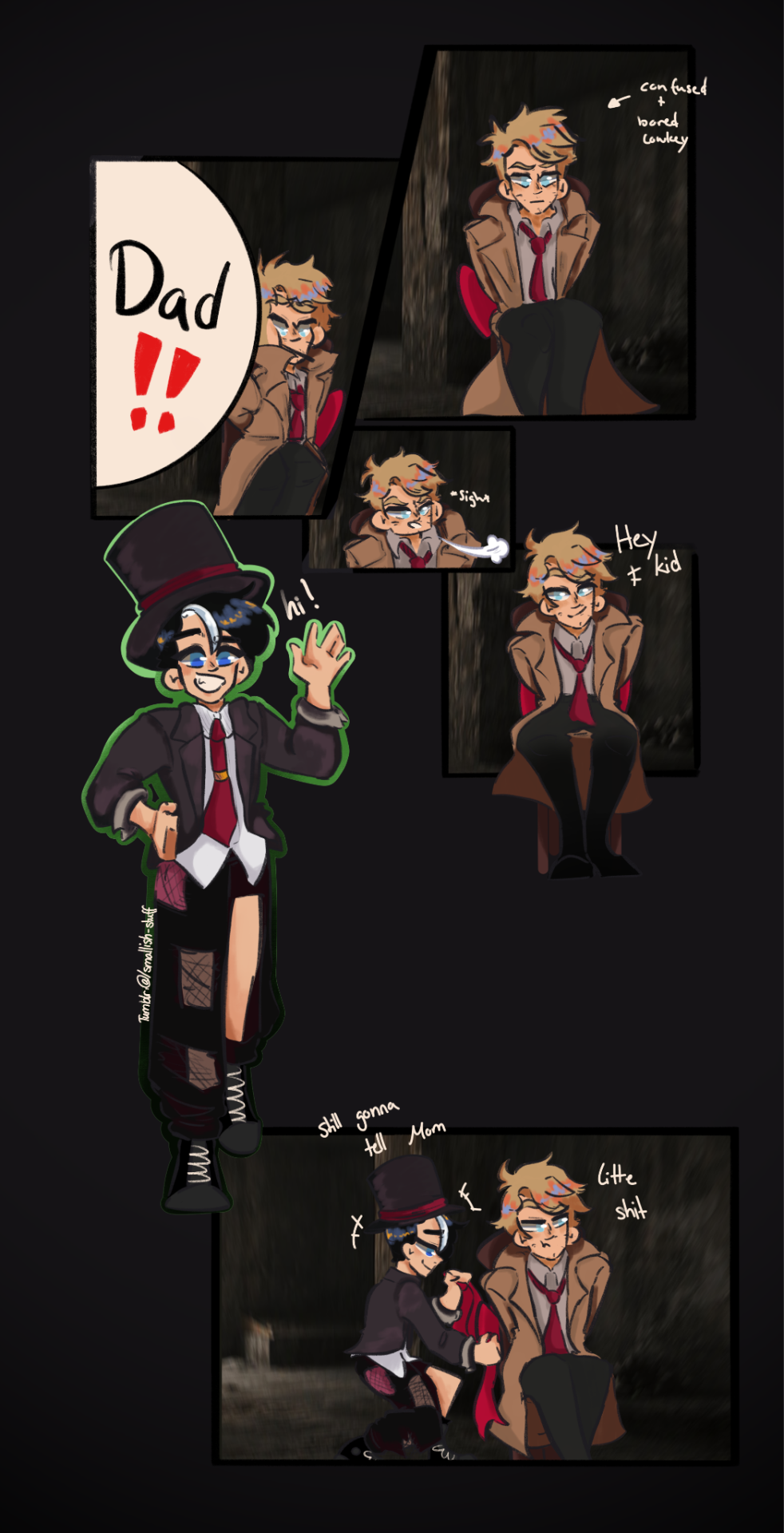
Visual picture of Constantine being embarrassed. (Yes, he's tied up with a RED RIBBON for funnsies.)
#dcxdp#dpxdc#this is part of my au#Not mentioned but Danny is in Young Just Us!#it will he shown later on#Danny is the kid of John and Zatanna#john loves the kid#in his own cursed way#his love language are curse words#the reason dannys name isnt a family tongue twister is cuz hes trans and named himself#officially hes zatannas side kick like she was to her dad#john takes him around sometimes#just to make sure he knows how to fight demons#when a legit magician and a chimera of a occultist man have a child#hes damn powerful#+ the whole ghost king business#SHOULD constantine be suprised his kid became a death god? no he shoulndt#zatanna blames him#at least hes a carbon copy of her#shes forever smug abt that#tbf hes a prince still#cant get the throne till hes 400 smth#THIS WILL HAVE SHIPS#thinking between deadtired and superdeadtired#maybe adding bart too#at this point its just a giant polycule#I FORGOT THE ART#FOLLOW MY ART ACC ?!?!?!
1K notes
·
View notes
Text
I know what the term “roman cancel” means in fighting game jargon, but whenever I hear it the first thing that immediately pops into my head is like
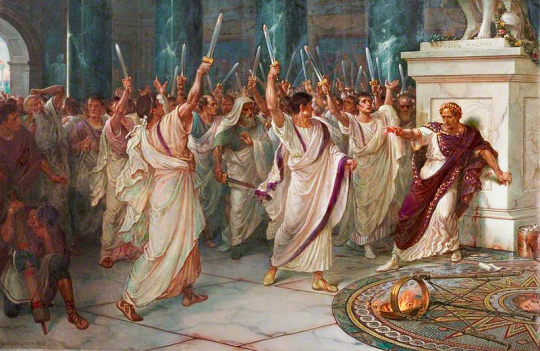
#gaming#video games#fighting games#history#ancient rome#julius caesar#the ides of march#language#linguistics#jargon#nomenclature#violence#death mention#(by implication)
13K notes
·
View notes
Note
Helllo i Love your art more than i love donuts and thats ALLOT.but my boy lucifer can have babys,like i dont even know how that works!make it make sense! I just wanna say thank you again for curing are boredom👍🏻
You are SO right that is high praise indeed! I'm honored! =D So here. Have a donut! 🍩🍩🍩 As for Luci, let us turn to the world's favorite 700k+ words old man fanfiction that is The Bible (tm) as according to their lore, it's been canonically stated that angels are genderless for they are beings made of the Pure Holy Spirit and- Holy SHIT! What do you know??? Our dear depressed duck dad was an angel himself and in some depictions Lilith is infertile as was her punishment for her freedom! The more you know! -Bubbly💙

(LMAO. My guy's been traumatized. Once is enough XD)
#In some beliefs it's also said that angels are asexual until they become fallen and mate with humans#spacebubblearts#hazbin hotel#charlie morningstar#lucifer morningstar#TAGS FOR THE CATHOLIC FANFICTION INCLUDE:#major character death#accidental baby acquisition#surprise pregnancy#author's first language isn't english sorry =P#anime logic#qustionable magic system#slow burn#TW: period typical racism#TW: depiction of sexism#TW: slavery#open ending#no beta we die like Jesus Name Amen#graphic depictions of death#resurrection AU#TW: mass genocide#mythical creatures generator#possible noncon romance#age difference#cursed#blessed#hurt/ comfort(?)#Top 10 anime betrayals#700k+ word count#First written: B.C. and Last Update: A.D.
291 notes
·
View notes
Text
Familia de prisioneros

Rbs are appreciated
Version without all the fancy lighting :D

#qsmp#philza#qsmp philza#qsmp tallulah#qsmp chayanne#qsmp missa#qsmp prison#qphilza#q missa#prison qsmp#death family#death duo#also the spelling might be off sorrey#spanish is first language but spelling is shitttt#pissa
366 notes
·
View notes
Text
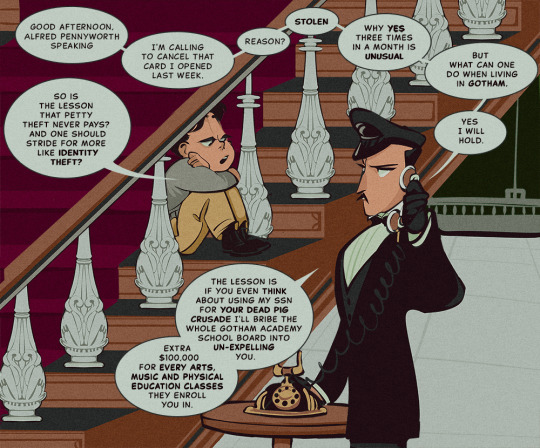
{Part 1} {Part 2} {Part 3}
When you can't bargain just outright steal.
#Batman#bruce wayne#alfred pennyworth#DC comics#DCAU#little bruce#I spent way too long on these stairs and there not even good lol#Fanart#My art#I like the idea that after Bruce's parents die Bruce often sits curled up like seen here as a subconscious protection precaution while#while before his parent's death bruce was much more open in his body language
2K notes
·
View notes